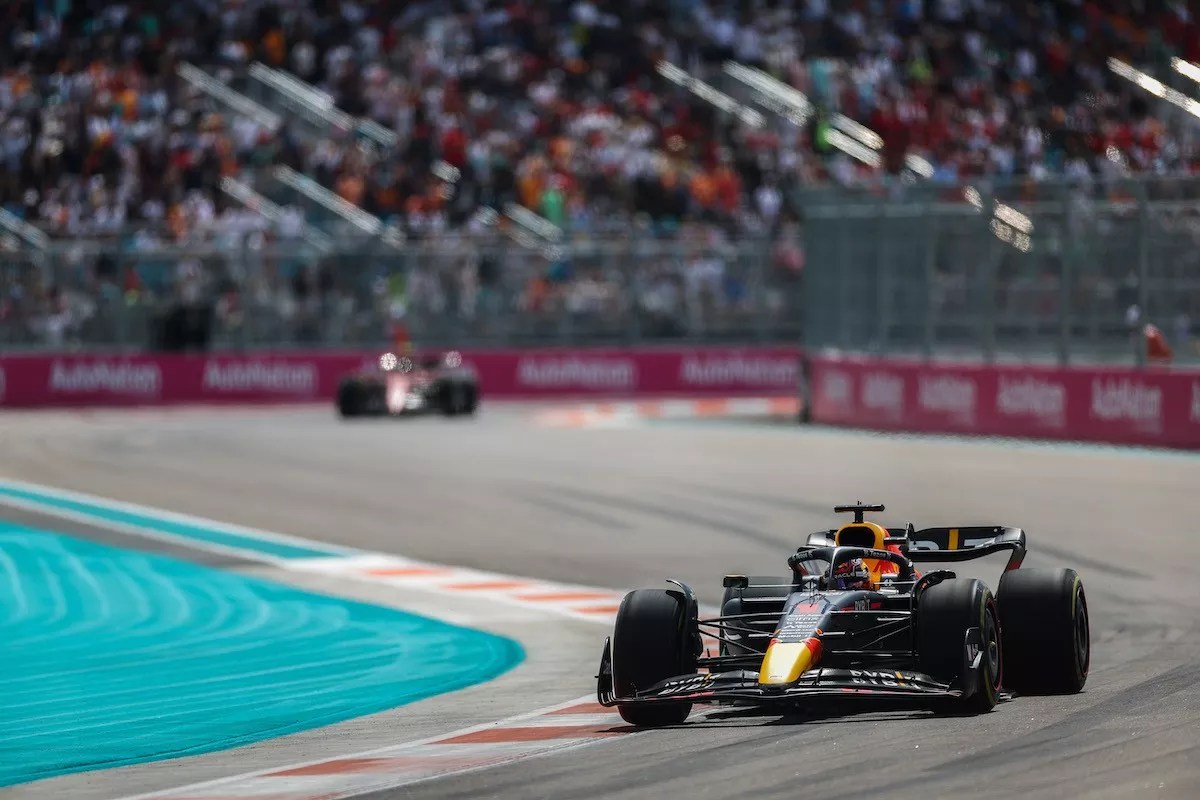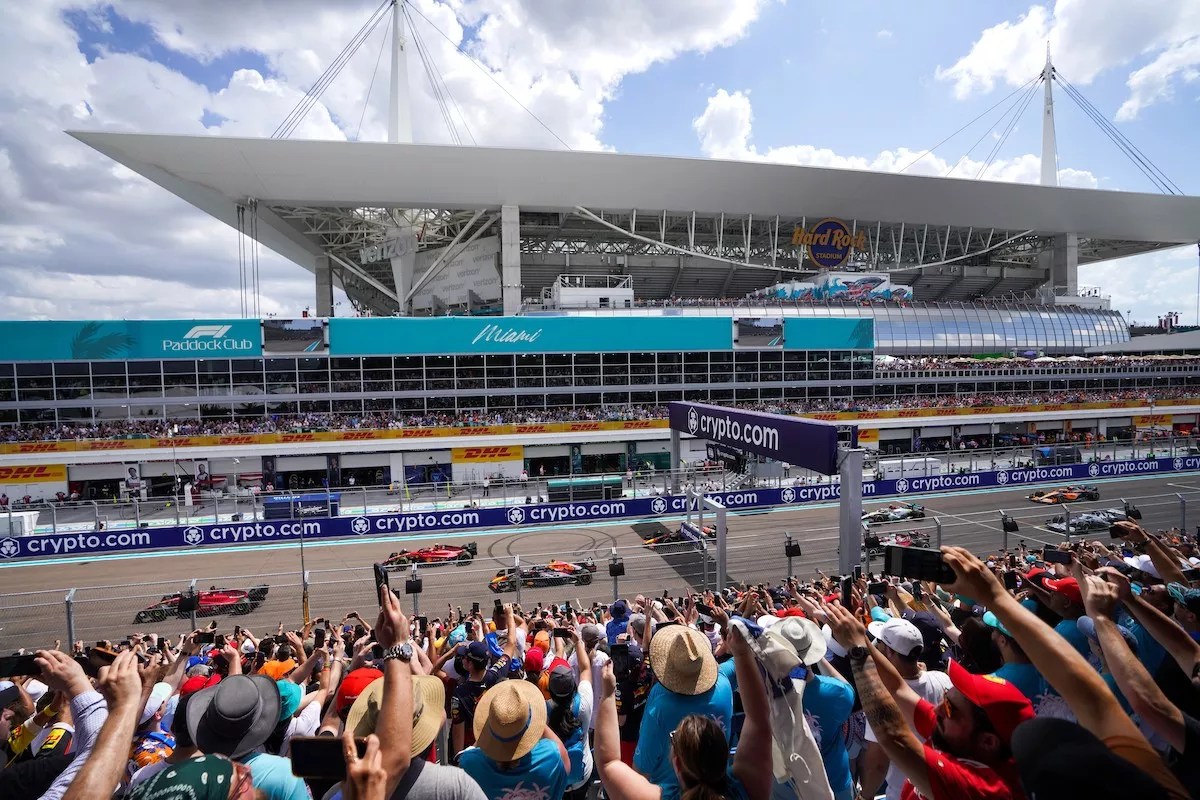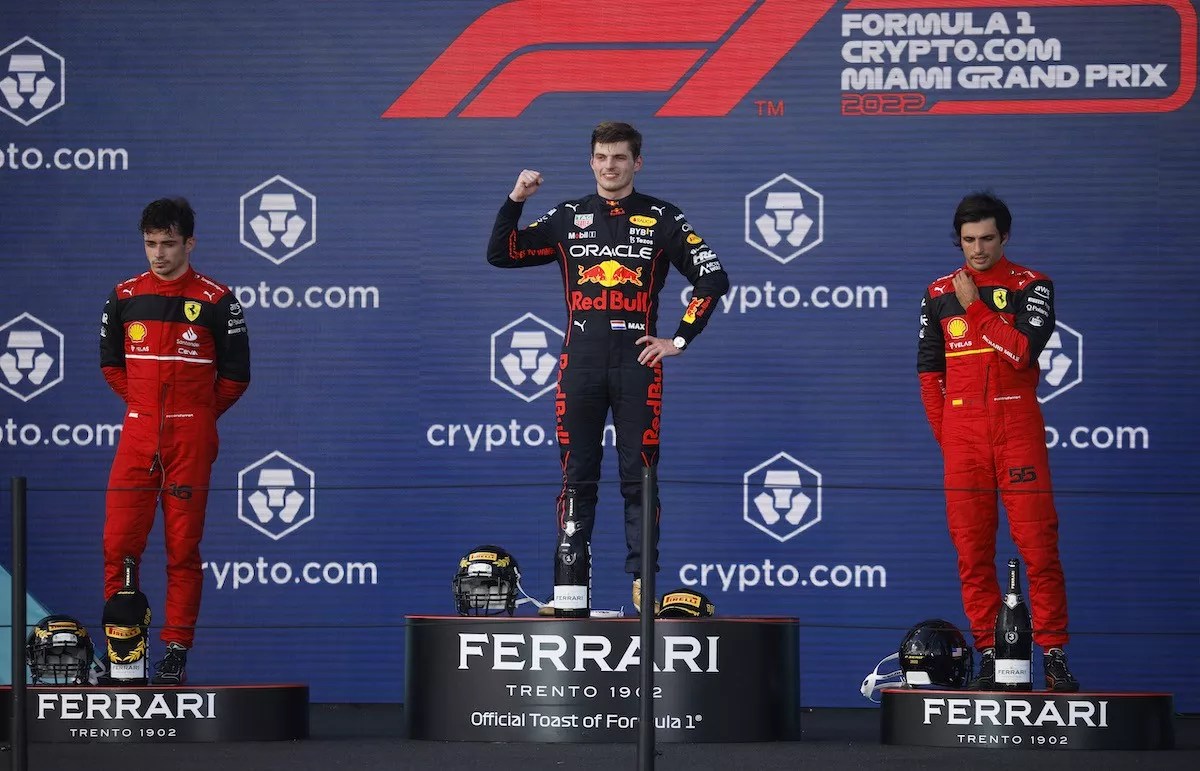
Photo by Peter Fox/Getty Images

Audio By Carbonatix
You’ve seen the billboards all over town. You’ve witnessed your friends in rapt discussion over the latest season of Drive to Survive. You may even have driven past the track on the Turnpike. The Formula 1 Miami Grand Prix is back. After a successful opening run last year, the star-studded race will return to Hard Rock Stadium May 5-7.
One problem: You don’t know the first thing about F1, and that’s where New Times comes in. Below, find all the answers to your burning questions about the world’s most popular motorsport. Remember, there’s no such thing as a stupid question – just stupid people.
So what is Formula 1?
The Formula 1 World Championship is the world’s most prestigious auto-racing competition. The highest class of international racing overseen by the International Automobile Federation (FIA), which also governs other motor sports such as rally racing and land-speed records, it boasts the best drivers, the wealthiest sponsors, the most exotic and glamorous racing locales, and most importantly, the fastest road-racing cars in the world. And it is truly a world championship, with races being held in far-off locations such as Singapore, Abu Dhabi, and SÁ£o Paulo, and its flagship event, the world-famous Monaco Grand Prix on the French Riviera.
Okay, but what’s so special about it? Isn’t it just a bunch of cars going around in a circle?
Well, broadly, yes. But you’re probably thinking of NASCAR, which takes place on an oval track. F1 cars, first of all, are open-wheeled, which means they’re more aerodynamic and faster than NASCAR stock cars, which are based on consumer vehicles. They’re also custom-made and specially engineered to go as fast as possible, with special hybrid engines and advanced tech. F1 race tracks, including the Miami International Autodrome, are designed to test the speed and agility of these cars and their drivers with daring twists and turns modeled after winding European roads. It’s true that racers are on a fixed circuit loop and do laps around it, but rarely is it shaped like an actual circle.

The crowds at the 2022 Miami Grand Prix
Photo by Alex Bierens de Haan/Getty Images
So… Is it fun to watch?
If you like watching fast cars race past again and again, you will enjoy yourself. Otherwise, F1 can get pretty monotonous – that is, until something happens. It might be the scramble for a position at the start of a race, a dogfight between cars trying to overtake one another, an engine failure, and sometimes, it might be a crash.
Is the sport dangerous? Don’t people die a lot in racing sports?
All sports carry some risk, especially contact sports like football and basketball, where injuries are commonplace at the professional level, and athletes, even in F1, tend to accept that risk if it means being able to compete. But motor racing is distinct because the risk of death – like dying in a horrifying crash – is much more of a reality. The sport’s early days were replete with drivers dying in crashes, and many of the sport’s legends have met their ends this way.
The last fatality during an F1 event was Brazilian driver Ayrton Senna, who was killed in a crash while qualifying for the San Marino Grand Prix in 1994. The tragedy spurred an increased emphasis on safety. As a result of technologies like the Halo device and the alteration of certain track elements, the sport is now much safer. There have certainly been exceptions: Romain Grosjean’s fiery crash at the 2020 Bahrain Grand Prix certainly comes to mind. But considering all the strides the sport has made in the name of safety, such incidents are the exception rather than the rule. And for regular viewers, a crash is never fun. The race is stopped, the driver might be injured or worse, and everyone holds their hearts in their throats until the all-clear is given.
What if I don’t care about cars at all? Why should I follow the sport?
For many fans, the real entertainment of F1 happens off the track. F1 is full of big personalities with even bigger egos: drivers willing to do anything to win, yes, but also absurdly wealthy team owners pouring their millions into fast cars for little more than bragging rights, as well as harried team principals under lots of pressure to make sure the cars run and the drivers don’t wreck them.
A fun, if somewhat inaccurate, way to see this in action is by watching Netflix’s hit docu-series Formula 1: Drive to Survive, where all the drivers, principals, and owners appear. The show enhances and skews the rivalries, gossip, and cutthroat competition, giving the sport a reality-TV treatment that’s one part Game of Thrones, another part Real Housewives. Give it a look.

Max Verstappen is favored to win the Miami Grand Prix again this year.
Photo by Chris Graythen/Getty Images
So… Who are the guys? Who should I root for?
The current F1 champion is young, curmudgeonly Dutch driver Max Verstappen, who in 2021 defeated reigning champ Lewis Hamilton under very controversial circumstances to earn his first title. He ran away with the trophy last year and is, as of writing and before the Azerbaijan Grand Prix in Baku, in first place for the 2023 championship after wins at the Bahrain and Australian grands prix. Verstappen’s teammate at Red Bull, the affable Mexican driver Sergio Perez, is in second place. He doubles as the only Latin-American driver on the grid this season.
Verstappen and Red Bull’s competition includes Mercedes-Benz, fronted by Hamilton, the sport’s winningest driver ever and the only Black driver on the grid, and up-and-comer and fellow Brit George Russell; Ferrari, featuring Monaco-raised Charles LeClerc and Spaniard Carlos Sainz; and championship-winning veteran Fernando Alonso, also from Spain and currently driving for Aston Martin.
Another notable face on the grid is Logan Sargeant, the rookie driver competing for venerable, struggling team Williams. He’s not just the first American in F1 since 2015 – he was born and raised in South Florida.
Why am I only hearing about all this now?
F1 has always been most popular in Europe, which forms the sport’s heartland, and past attempts to popularize it in America fell flat. In 2016, the Formula One Group, the holding company that promotes the sport, was purchased by Liberty Media, which also currently owns Sirius XM Satellite Radio and the Atlanta Braves. The American owners have launched an aggressive campaign to make F1 stick in the U.S. Drive to Survive has been a big part of that, but so has holding races in the country. This includes the United States Grand Prix, held in Austin, Texas, since 2012, as well as brand new races in exotic destination cities, specifically Miami, which began last year, and Las Vegas, which debuts later in 2023.
What’s it like to go to the Miami Grand Prix?
It depends on how much you pay. The organizers have been very keen on marketing the race as a North American version of Monaco, with luxury suites, dining, concerts, and plenty of glitz and glamour – oh, and some racing, of course – across the event’s three days. (F1 races typically hold practice runs on Friday, qualifying runs to determine starting order on Saturday, and the race on Sunday.) Last year’s event faced criticism from VIPs who felt the experience was subpar compared to other grands prix. Maybe they weren’t charmed by the fake marina (don’t worry, it has water this year!) or the tacky podium celebration that put race winner Verstappen in a football helmet. Still, if you’re curious, the cheapest ticket for the Miami Grand Prix, a “campus pass” that does not include a grandstand seat to watch the race itself, will set you back a measly $600. Enjoy!
Formula 1 Miami Grand Prix. Friday, May 5, through Sunday, May 7, at Hard Rock Stadium, 347 Don Shula Dr., Miami Gardens; 305-943-8000; hardrockstadium.com. Tickets cost $590 to $6,000 via f1miamigp.com.